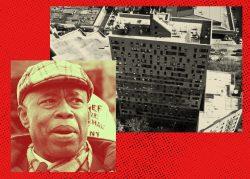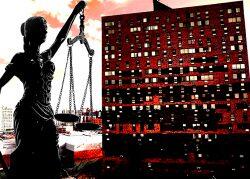Two months after a fire in the Bronx killed 17 New Yorkers, Mayor Eric Adams said he would work with the City Council to pass fire safety legislation to help prevent another tragedy.
One measure on Adams’ agenda would require sprinklers in city apartment buildings — an idea that Council members sent back to the drawing board in late 2020 after owners said it would be disruptive to tenants, impractical and unaffordable.
Landlords now say they’re willing to work with the city on a new proposal. But they are quick to add that any legislation must consider the financial toll on owners, who have struggled to collect rent throughout the pandemic and coped with rising costs.
Neither the City Council nor the mayor has said how they would tweak the measure.
The original bill, introduced in 2018 by former Council member Barry Grodenchik after a 2017 fire in the Belmont section of the Bronx claimed 13 lives, called for automatic sprinklers in buildings 40 feet or taller. Owners who do not comply would face penalties of $250 to $10,000, depending on the size of the building.
Landlords said the cost would be “astronomical” — as much as $20,000 per apartment, plus another $30,000 to upgrade water lines, real estate lawyer Stuart Saft estimated.
Read more


Others emphasized the challenge of finding temporary homes for tenants during sprinkler installations. In a hearing on the bill, the Community Housing Improvement Program, a landlord group, said tenants would be displaced for weeks or months.
To install sprinklers, workers typically must break open ceilings, potentially releasing asbestos or lead. Upgrading water systems can also necessitate moving tenants out.
“This is not just walking in and changing a light bulb,” Jan Lee, an owner of two rent-stabilized buildings in Chinatown, told The Real Deal in 2020. “This is major disruption.”
Swayed by owners’ arguments, former Council member Robert Cornegy, who chaired the committee on housing and buildings, said he would work with Grodenchik on amending the bill. But both members left office at the end of 2021.
Adams’ calls for reform would require the revamped City Council — 35 of the 51 members won their seats last year — to craft some type of compromise.
Jay Martin, executive director of owners group Community Housing Improvement Program, said CHIP understands the importance of sprinklers, but that any bill must consider where to put tenants and how to schedule and pay for renovations.
“Fires are literally the biggest fear of any property owner,” Martin said. “But it’s not as simple as saying, ‘Well, this is a safety issue.’ If it were that easy, it would have been done already.”
Martin said for rent-stabilized owners, in particular, renovations could push up operating costs by “thousands of dollars” and would be impossible to pass off to tenants. In market-rate buildings, owners could raise rents in an effort to cover renovations. But those hikes would come in a rental market that saw prices break records just last month.
“Can renters afford the cost of doing this?” Martin said.
For CHIP to get on board, Martin said the city would need to consider reimbursing owners for the cost, which he estimated could be several billion dollars, citywide.
A spokesperson for the mayor’s office did not address how a new version of the bill might quell owners’ concerns, but said Adams looks forward to collaborating with the Council on “this critical legislation.”
Council member Pierina Sanchez, who was born and raised in the Bronx and now chairs the housing and buildings committee, acknowledged that increasing the “safety, resilience and the overall health of our housing stock will always come with a price tag and all investments should be approached thoughtfully.”
Sanchez said she would consider a methodology for sprinkler retrofits to determine where they should be required.
City Council Speaker Adrienne Adams did not comment in time for publication.
In a statement, Council Majority Whip Selvena Brooks-Powers applauded the mayor for “shepherding legislation to strengthen fire safety,” but did not return a request to elaborate.
This article has been updated with a comment from Council member Pierina Sanchez. It has been corrected to reflect that CHIP Executive Director Jay Martin estimated that a citywide sprinkler retrofit could cost billions of dollars, not $1 billion.
